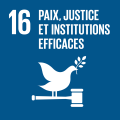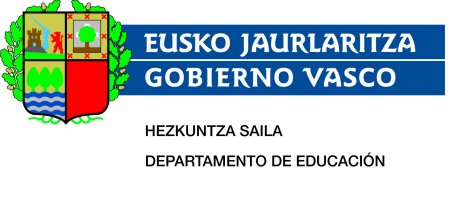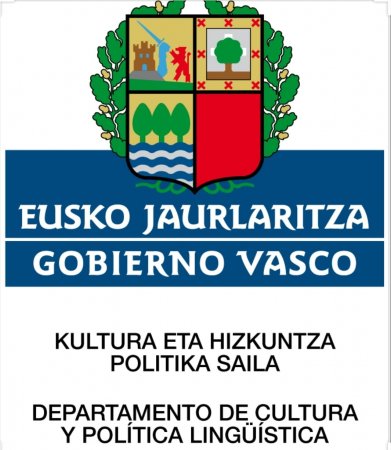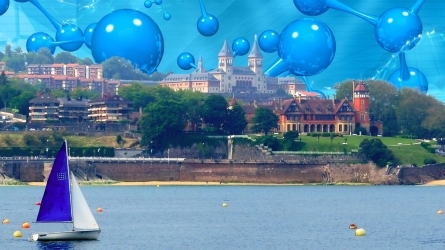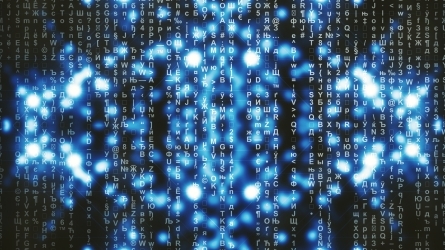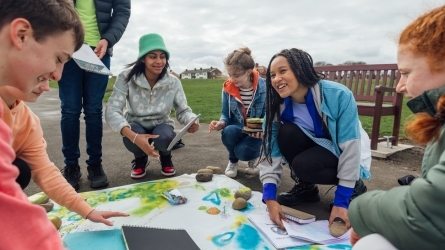
Irakasleen arteko harreman pedagogikoak. Heztea bestearekin jardutea denean
Harremanek eskolako klima eraikitzen dute, bertan arnasten den airea nolakoa den baldintzatuz; halaber, eskolako ohituretan, identitatean eta estiloan ere eragina dute.
Description
Hezte prozesuan irakasleen artean dagoen harremanaren eta haren izaera pedagogikoaren inguruko hausnarketa abiatzea da Uda Ikastaro honen helburu nagusia. Irakasleek heziketa prozesuaren funtsezko katebegia osatzen dute, eta eskola testuinguruan beste eragile zein agente batzuekin (familiak, ikasleak, komunitatea…) harremanak izatea ezinbestekoa den neurrian, irakasleek haien lankideekin eraikitzen dituztenak ere aintzat hartzekoak dira. Ezinezkoa da irakasle lanbidea harremanik gabe ulertzea.
Harremanek, gainera, eskola testuinguruan izaera pedagogikoa dute, elkarrenganako eragina dakartelako berekin eta pertsona bat edo gehiagoren arteko etengabeko elkartrukea delako. Hezkuntza fenomeno etikoa da, eta hezkuntza eremuko aktoreen arteko etengabeko harremana du ezaugarri: ikasleekin, familiekin, beste irakasleekin, jangelakoekin... izaten diren harremanek eta haien izaerek antzaldatzeko gaitasuna duten neurrian, balio sinboliko nabarmena dute eta eskola birdefinitzeko gakoak dira.
Edozein aldaketa, berrikuntza edota hobekuntza sustatzeko orduan, ekimen horiek harreman mapa baten gainean proposatzea beharrezkoa eta ezinbestekoa da: izan ere, nola aldatu zerbait aldaketa hori gauzatu behar duten eragileak ez badaude eroso? Eskolan dauden askotariko elkartrukeak kontuan hartzeak prozesu demokratikoagoak eta sakonagoak bideratzea ahalbidetzen du. Harreman txarren testuinguru batean askoz ere konplexuagoa da berrikuntza bat abiatzea, konfiantza faltak, aldaketarako erresistentziak edota inertzia txarrek prozesua oztopatzen dutelako. Harreman osasuntsuek, aldiz, irakasleen arteko lankidetza sareak sustatzen dituzte, harreman horizontalei esker, errealitate bati erantzun eranginkorrak emanez eta beharrak zehaztasunez identifikatuz. Hala, egokitzen zaizkion erronken aurrean, irakasleak erantzunak emateko jarrera proaktiboa izango du.
Honenbestez, harremanek eskolako klima eraikitzen dute, bertan arnasten den airea nolakoa den baldintzatuz; halaber, eskolako ohituretan, identitatean eta estiloan ere eragina dute. Ikuspegi inklusibo batetik, harremanak sormenerako eta hezteko espazio ere badira, bestearekiko jarrera enpatikoa eta ulerkorra eraikitzea ahalbidetzen dutelako, elkarrenaganako aintzatespena eta zenbaitetan ikusezin diren horien ikusgarritasuna posible eginez.
Harremanak ez dira elkartruke soil bat; harremanak balio sinbolikoa duten konektoreak dira. Askotan ikusezinak diren arren, eta horrek konplexuagoa egiten badu ere, horiek zaindu eta elikatzeko plana beharrezkoa da. Zentzu horretan, badira harremanei dagokionean identifikatuko ditugun bi une kritiko: batetik, irakasle hasiberrien kasua eta bestetik, irakasleen garapen profesionalari dagokiona. Biek zuzenean eragiten diete harremanei, eskolako klimari eta heziketako kulturari, edozein aldaketa prozesuren arrakasta lortzeko gako bilakatuz.
Objectives
Irakasleen arteko harremanen zein haien izaera pedagogikoaren inguruan hausnartzea.
Harremanek eta haien konplexutasunak zein interdependentziak duten eraginaren inguruan gogoeta egitea.
Harremanen inguruko analisi hau irakasleen bizipen eta esperientzietatik abiatuta garatzea.
Harreman osasuntsuak eraikitzeko eskola testuinguruan aintzat hartu beharreko dimentsioak identifikatzea eta horiei aterabidea emateko proposamenak garatzea.
Eskola beste parametro eta egitura batzuetatik pentsatzeko proposamen eraldatzaileak pentsatzea, irakaslea eta bere zaintza erdigunean jarriz, eta hezkuntzako praktiken gaineko azterketa kritikoa sustatuz ikuspegi holistikoago batetik.
Activity directed to
- University student
- Teachers
- Professionals
In collaboration with
Program
25-06-2025
Erregistroa / Registro
Presentation by the Director of the activity
- Estibaliz Amenabarro Iraola | Euskal Herriko Unibertsitatea - Irakasle doktorea
“Irakasleen arteko harreman pedagogikoak. Heztea bestearekin jardutea denean“
- Estibaliz Amenabarro Iraola | Euskal Herriko Unibertsitatea - Irakasle doktorea
“Una educación con rostro humano: La Pedagogía de la Alteridad“
- Eduardo Romero Sanchez | Murtziako Unibertsitatea - Irakasle Titularra (Participation by zoom)
Break
“Irakasleen arteko harremanak eta haien izaera pedagogikoaren inguruko hausnarketa kolaboratiboa (lan saioa)“
- Estibaliz Amenabarro Iraola | Euskal Herriko Unibertsitatea - Irakasle doktorea
26-06-2025
“Irakasleen arteko harremanen inguruko kartografiak eta tratu onetan oinarritutako narratibak eraikitzen“
- Estibaliz Amenabarro Iraola | Euskal Herriko Unibertsitatea - Irakasle doktorea
Break
Round table: “Harremanak zaintzeko kultura baterantz ikastetxean. Zaindu beharreko dimentsioak“
- Estibaliz Amenabarro Iraola | Euskal Herriko Unibertsitatea - Irakasle doktorea
- Nere amenabar Perurena | EUSKAL HERRIKO UNIBERTSITATEA - IRAKASLE AGREGATUA
Directors
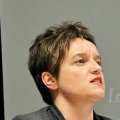
Estibaliz Amenabarro Iraola
Hezkuntza, Antropologia eta Filosofía Fakultatea, UPV/EHU, Profesora doctora
PhD in Pedagogy (UPV/EHU, 2021). Currently lecturer in the degrees of Pedagogy and Social Education and in the Master of Secondary Education. The main lines of research revolve around teachers, pedagogical relationships and how these relationships impact on school organisation; the pedagogy of otherness, teacher care, the way of observing and recognising others from an inclusive perspective, are the axes on which the research is based. She is also a member of INKLUNI, a benchmark in research on children and adolescents with Rare Diseases in the context of the Basque Autonomous Community. She participates at national level in the Research Group on Attention to Diversity (GRAD) of the University of Vic-Central University of Catalonia, developing a project of the Ministry of Science and Innovation, entitled: "Collaboration between teachers in the development of Cooperative Learning for the most vulnerable Inclusion" (PID2021-128456NB-I00). Finally, she participates as a researcher in the Askiak project, promoted by the Provincial Council of Gipuzkoa, in a social innovation project on girls and adolescents in vulnerable situations.
Speakers

Nere amenabar Perurena
Doctorate in Pedagogy (UPV/EHU 2013), and Associate Professor in the Department of Didactics and School Organization. Her research areas encompass educational technology and digital literacy, currently focusing on the use of technology (such as social networks and smartphones) by adolescents, as well as digital inclusion. She participates at the national level in the Research Group on Diversity Care (GRAD) at the University of Vic-Central University of Catalonia, developing a project funded by the Ministry of Science and Innovation titled "Collaboration among Teachers in the Development of Cooperative Learning for the Most Vulnerable Inclusion" (PID2021-128456NB-I00). Additionally, she belongs to the UNESCO Chair of Communication and Educational Values as permanent staff, where she has been involved in various research projects. Currently, she is participating in the project entitled "Intervention to improve the responsible and critical use of digital devices by Latin American adolescents" (EHU-L23/22).

Estibaliz Amenabarro Iraola
Hezkuntza, Antropologia eta Filosofía Fakultatea, UPV/EHU, Profesora doctora
PhD in Pedagogy (UPV/EHU, 2021). Currently lecturer in the degrees of Pedagogy and Social Education and in the Master of Secondary Education. The main lines of research revolve around teachers, pedagogical relationships and how these relationships impact on school organisation; the pedagogy of otherness, teacher care, the way of observing and recognising others from an inclusive perspective, are the axes on which the research is based. She is also a member of INKLUNI, a benchmark in research on children and adolescents with Rare Diseases in the context of the Basque Autonomous Community. She participates at national level in the Research Group on Attention to Diversity (GRAD) of the University of Vic-Central University of Catalonia, developing a project of the Ministry of Science and Innovation, entitled: "Collaboration between teachers in the development of Cooperative Learning for the most vulnerable Inclusion" (PID2021-128456NB-I00). Finally, she participates as a researcher in the Askiak project, promoted by the Provincial Council of Gipuzkoa, in a social innovation project on girls and adolescents in vulnerable situations.

Eduardo Romero Sanchez
Full Professor of the Department of Theory and History of Education at the University of Murcia. Graduate and Doctor in Pedagogy with Final Bachelor's Award and Extraordinary Doctorate Award. General Coordinator of the Ibero-American Network for the Development of the Professional Identity of Teachers (RIDIPD). Head of Research at the Observatory of Social Exclusion of the University of Murcia (OES). Member of the “Values Education” Research Group. Professor of the PIMSA Distinguished Chair of Education in Values at CETYS University (Mexico). Qualified as Excellent in the Teacher Teaching Activity Evaluation Program (DOCENTIA-UMU) verified by ANECA. He has completed several stays, including the one at the Institute of Education (University of London) with Professor Paul Standish. He is the author of around eighty publications including articles in scientific journals, books and book chapters. His lines of research are located in the areas of Philosophy and Anthropology of Education and address topics such as the pedagogy of otherness and the ethical dimension of education. It has two six-year research periods accredited by the CNEAI.
Registration fees
| Face-to-face | Until 25-06-2025 |
|---|---|
| 74,00 EUR | |
| 63,00 EUR | |
| 52,00 EUR | |
| 25,00 EUR | |
| 63,00 EUR | |
| 63,00 EUR | |
| 63,00 EUR | |
| 63,00 EUR |
| Live online | Until 25-06-2025 |
|---|---|
| 74,00 EUR | |
| 63,00 EUR | |
| 52,00 EUR | |
| 25,00 EUR | |
| 63,00 EUR | |
| 63,00 EUR | |
| 63,00 EUR | |
| 63,00 EUR |
Venue
Miramar Palace
Pº de Miraconcha nº 48. Donostia / San Sebastián
Gipuzkoa
Miramar Palace
Pº de Miraconcha nº 48. Donostia / San Sebastián
Gipuzkoa
Sustainable development goals
Agenda 2030 is the new international development agenda approved in September 2015 by the United Nations. This agenda aims to be an instrument to favour sustainable human development all over the planet, and its main pillars are the eradication of poverty, a reduction in equality and vulnerability and fostering sustainability. It is a unique opportunity to transform the world up to 2030 and guarantee human rights for all.

3 - Good health and well-being
Guarantee a healthy life and foster the well-being of all people of all ages. Key issues: universal healthcare coverage, sexual and reproductive health, reduction in the number of road accident casualties, pollution and chemical products, reduction in maternal and neonatal mortality, the end of epidemics such as AIDS, combating hepatitis and other water-borne diseases, drug and alcohol prevention, control of tobacco.
More information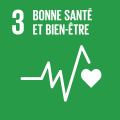
4 - Quality education
Guarantee quality education that is inclusive and equitable and foster opportunities for lifelong learning for everyone. Key issues: free-of-charge, equitable and quality education, access to higher education and training on an equal basis, education for sustainable development, suitable education centres for persons with disabilities, and safe, non-violent and efficient learning environments.
More information
10 - Reduced inequalities
Reduce inequality in countries and between them. Key issues: promotion of the social, economic and political inclusion of all people, equal opportunities, fiscal, wage and social protection policies to favour equality, migration and the policies that affect it, official assistance for the development, regulation and supervision of world institutions and markets.
More information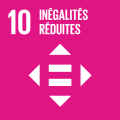
16 - Peace, justice and strong institutions
Foster peaceful and inclusive societies for sustainable development, facilitate access to justice for everyone and construct efficient and inclusive institutions that are accountable at all levels. Key issues: a reduction in violence, mistreatment and exploitation, the rule of law, equal access to justice, a reduction in corruption and bribery, efficient and transparent institutions, participation, access to information, protection of fundamental freedoms.
More information